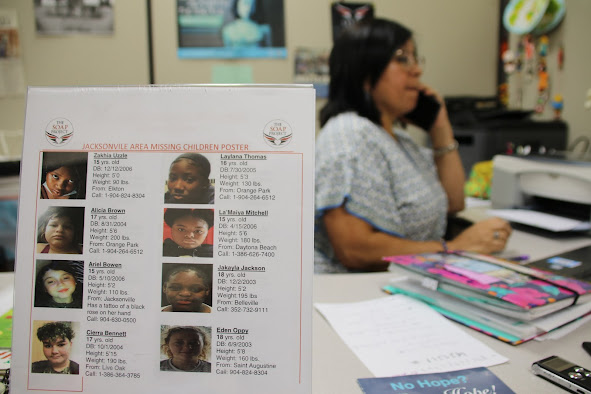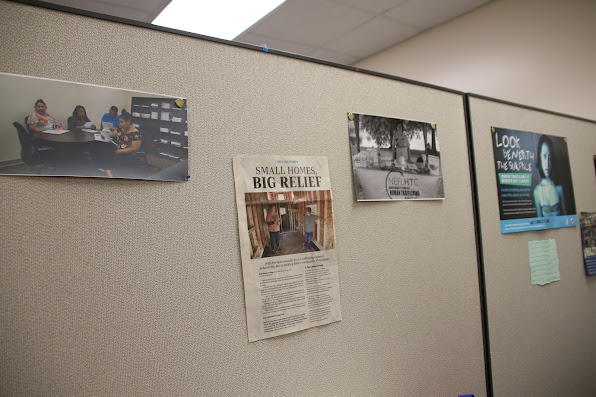[English version]
As soon as she graduated from high school at the age of 17, Silvia Almond decided to be a missionary after meeting an American evangelical couple working in her hometown of Ambato in Ecuador. She came from an educated upper middle class family and her parents, both successful professionals and business owners, had the expectation that she continue her studies and attend a proper university, so she obliged and got a degree in business administration.
Interestingly, the whole time she went to school she devoted herself to helping people in need and preaching the message of Christ in the Bible. The first thing the missionaries made her aware of was that she was getting into a profession that offered little money and a lot of sacrifice; but she assured them that that was what she really wanted to do and she felt that commitment within her to serve the people.
That philanthropic mission that she embarked on since the late 1980s has taken her to many parts of the world such as Africa and Latin America, where she has helped refugees come to the United States and where she presently lives.
 |
| Photo credit: Don Juan Corzo |
“There were so many cases of people who needed help that took much more going on a few visits to Latin America, that at one point I went to live in Nicaragua for two years when I was already living here,” said Silvia, who has lived in Jacksonville for more than 12 years.
Silvia, 53, moved to the United States in 1991 when she married a young American missionary whom she had met in Ecuador. Despite both being devoted to serving immigrant communities in an altruistic way, the relationship ended in a divorce due to differences that developed between them after living in California for several years. But the disappointment of a failed relationship did not take away the young Ecuadorian woman's conviction to continue helping others. At first she worked in low skilled jobs that did not require specialization, but eventually Silvia got involved again in missionary or social work, for example, helping the elderly in nursing homes in several states such as Pennsylvania, South Carolina and Georgia.
At some point her work helping immigrants with refugee status or those who are undocumented took almost a backseat when she began working on human trafficking cases more than 15 years ago. Contrary to what many people think, most of the victims of human trafficking are American, although there are foreigners who fall into the abyss of sexual slavery as well.
"Another thing is that many people who believe the danger comes only from men and strangers, but we have also handled cases where victims of human trafficking where the criminals have been women, family members or friends," revealed Silvia, since she has handled cases of sexual slavery from the state of Colorado to the jungles of Peru in South America.
 |
| Photo credit: Don Juan Corzo |
She clarified that the missions she is a part of are not raids with firearms and arrests as the police usually does; instead, some members in her rescue team pretend to be clients looking for prostitutes and once they take them out of the club to supposedly take them to a hotel, they reveal to the victims who they actually are actually and take them to safety.
A reality that hit her harshly was when she went to do her first operation in the Dominican Republic 15 years ago with an undercover officer and a team where they went to rescue a young woman. When the undercover officer brought the victim to the car to get her away from the brothel, Silvia saw that she was just a 10-year-old girl. Another case in recent years was in Nicaragua where they rescued a 4-year-old girl. Cases of child prostitution are also seen in the United States and the office of the Federal Bureau of Investigation (FBI) in Jacksonville confirmed that they recently rescued a 9-year-old girl in North Florida.
For that reason, since 2018, Silvia is also the Jacksonville president of Save Our Adolescents from Prostitution (SOAP), a national organization that raises awareness about the risk of sexual slavery for minors as well as young adults.
“We have cases that end badly, such as that of a very pretty 19-year-old Caucasian American victim who was receiving our support locally and she was found dead about three months ago, shot and stabbed in the back,” Silvia shared with a melancholic look on her face.
However, the dedicated missionary revealed that other cases have a positive ending where the victim manages to escape the world of sexual slavery, as was the case of a young Mexican woman in her twenties who was rescued in Colorado and currently lives in Jacksonville and earns good income as a dispatcher for a trucking company.
Through her work against human trafficking, the Ecuadorian missionary has worked with various organizations such as the American division of World Relief of the United Nations and the Women's Center of Jacksonville (WCJ) and law enforcement agencies such as the Federal Bureau of Investigation (FBI) and U.S. Marshals Service (USMS). Silvia recalls when she came to Jacksonville in 2007 there wasn't really a good system in place to combat human trafficking, but it has improved over the years.
Currently, she works for the Villages of Hope, a nonprofit organization that helps victims of human trafficking, and she is also a member of the board of directors for the Northeast Florida Human Trafficking Coalition, to which the FBI and the Jacksonville Sheriff's Office (JSO) are a part of.
~~~~~~~~~~
[Spanish version]
Tan pronto que se graduó del colegio a los 17 años edad en Ecuador, Silvia Almond decidió ser misionera después de conocer una pareja de misioneros estadounidenses que trabajaban en Ambato, su ciudad natal. Su familia era educada y de clase media alta y sus padres que eran profesionales y empresarios exitosos tenían expectativas de que ella asistiera a la buena universidad allá y así obtuvo un grado en administración de empresas.
Pero durante todo el tiempo se dedicó al trabajo a ayudar a personas en necesidad y pregonar el mensaje cristiano de la biblia. Aunque los misioneros le señalaron al principio que era de una profesión de sacrificio y no para hacer dinero, ella les aseguro que eso era lo que quería hacer y lo que sentía ese compromiso dentro de ella para servir a la gente.
Esa misión filantrópica en la que se embarcó desde el final de los 80 la ha llevado a muchas partes del mundo como África y Latinoamérica, donde ha ayudado a refugiados a venir a los Estados Unidos.
 |
| Photo credit: Don Juan Corzo |
“Había tantos casos de gente que necesitaba ayuda que lo que debió ser solo unas visitas, yo termine yéndome a vivir a Nicaragua por dos años cuando yo ya residía aquí”, dijo Silvia, quien ha vivido en Jacksonville por más de 12 años.
Silvia, de 53 años de edad, se mudo a los Estados Unidos en 1991 cuando contrajo nupcias con un joven misionero americano con quien se había ennoviado en Ecuador. A pesar ambos ser devotos a servir a la comunidad inmigrante de manera altruista, desafortunadamente, la relación terminó en un divorcio por diferencias que se desarrollaron entre ellos después de vivir en el país varios años. Pero esta desilusión no le quitó a la joven ecuatoriana su convicción de seguir ayudando a otros. Aunque al principio ella también trabajó en labores comunes que no requerían especialización, eventualmente Silvia se involucró otra vez en funciones de misionera y trabajadora social, por ejemplo, ayudando a personas de la tercera edad en ancianatos en varios estados como Pensilvania, Carolina del Sur y Georgia.
Su labor ayudando en la comunidad a personas inmigrantes con estatus de refugiados o aquellos que son indocumentados, tomó casi un segundo plano cuando ella empezó a trabajar casos de tráfico humano hace más de 15 años. Al contrario de lo que muchos piensan, la mayoría de las víctimas del tráfico humano son americanas aunque hay extranjeras que caen al abismo de la esclavitud sexual tambien.
“Otra cosa es que mucha gente que cree el peligro viene solamente de hombres y extraños, pero también hemos manejado casos donde víctimas de tráfico humano donde los criminales han sido mujeres, miembros de familia o amigos”, revelo Silvia, pues ha tratado casos de esclavitud sexual desde el estado de Colorado hasta las selvas de Peru en Suramerica.
 |
| Photo credit: Don Juan Corzo |
Ella aclaró que sus misiones no son redadas con armas de fuego y arrestos como acostumbran los policías, sino que sus colegas pretenden ser clientes buscando prostitutas y una vez las sacan del antro para supuestamente llevarlas a un hotel, ellas revelan a las mujeres quienes son ellos en realidad y las salvan.
Una realidad que le pegó duro a fue cuando fue a hacer su primer operativo en la República Dominicana hace 15 años con un oficial encubierto y un equipo donde fueron a rescatar una joven. Cuando el oficial encubierto trajo a la víctima al carro para escaparse, Silvia vio que era una niña de solo 10 años de edad. Otro caso que trato en los recientes años fue en Nicaragua donde rescataron a una niña de solo 4 años de edad. Casos de prostitución infantil se ven también en Estados Unidos y la oficina del Federal Bureau of Investigation (FBI) en Jacksonville confirmó que rescataron a una niña de 9 años recientemente en el norte de Florida.
Por esa razón desde 2018, Silvia es también la presidente en Jacksonville de Save Our Adolescents from Prostitution (SOAP), una organización nacional para traer conciencia sobre el riesgo para menores de edad también.
“Tenemos casos que terminan mal como fue el de una víctima anglo americana de 19 años muy bonita que estaba recibiendo nuestro apoyo y la encontraron muerta hace como tres meses apuñalada y baleada por la espalda”, dijo Silvia con una triste mirada.
Sin embargo, la dedicada misionera reveló que algunos casos tienen un final positivo donde la víctima logra escapar el mundo de la esclavitud sexual como fue el caso de una joven mexicana en sus 20s quien fue rescatada en Colorado y actualmente vive en Jacksonville y gana buen dinero como despachadora de camiones de servicios de envio.
A través de su trabajo en contra del tráfico humano la misionera ecuatoriana ha trabajado con varias organizaciones como la división americana de World Relief de las Naciones Unidas y Women’s Center of Jacksonville (WCJ) y agencias de la ley como el Federal Bureau of Investigation (FBI) y U.S. Marshals Service (USMS). Silvia recuerda que cuando vino a Jacksonville en el 2007 no había realmente un buen sistema establecido para combatir el tráfico humano, pero ha mejorado con los años.
Actualmente, ella trabaja para Villages of Hope, una organización que ayuda víctimas de tráfico humano y es parte de la mesa directiva de la Northeast Florida Human Trafficking Coalition, al cual pertenecen el FBI y el Jacksonville Sheriff’s Office (JSO).
-
A version of this story was published in Hola News Newspaper on October 12, 2022.



